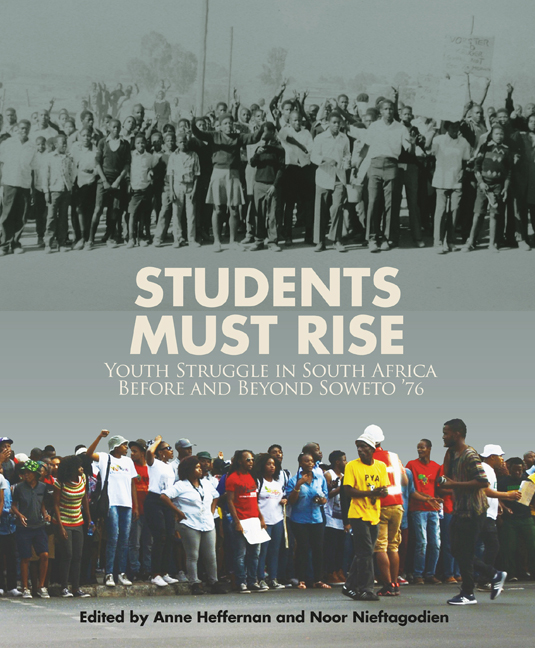Book contents
- Frontmatter
- Acknowledgements
- Contents
- Timeline
- Map Of South Africa
- Glossary
- Abbreviations
- Introduction: narratives of the student struggle
- Chapter 1 A brief history of the African Students’ Association
- Chapter 2 Youth and student culture: Riding resistance and imagining the future
- Chapter 3 The role of religion and theology in the organisation of student activists
- Chapter 4 Student organisation in Lehurutshe and the impact of Onkgopotse Abram Tiro
- Chapter 5 The University of the North: A regional and national centre of activism
- Chapter 6 Action and fire in Soweto, June 1976
- Chapter 7 What they shot in Alex
- Chapter 8 SASO and Black Consciousness, and the shift to congress politics
- Chapter 9 Youth politics and rural rebellion in Zebediela and other parts of the “homeland” of Lebowa, 1976–1977
- Chapter 10 My Journey, our journey: Activism at Ongoye University
- Chapter 11 ‘Let's begin to participate fully now in politics’: Student politics, Mhluzi township, 1970s
- Chapter 12 ‘They would remind you of 1960’: The emergence of radical student politics in the Vaal Triangle, 1972–1985
- Chapter 13 The ends of boycott
- Chapter 14 Fighting for ‘our little freedoms’: The evolution of student and youth politics in Phomolong township, Free State
- Chapter 15 ‘Every generation has its struggle’: A brief history of Equal Education, 2008–15
- Chapter 16 Contemporary student politics in South Africa: The rise of the black-led student movements of #RhodesMustFall and #FeesMustFall in 2015
- Selected Bibliography
Chapter 1 - A brief history of the African Students’ Association
Published online by Cambridge University Press: 21 April 2018
- Frontmatter
- Acknowledgements
- Contents
- Timeline
- Map Of South Africa
- Glossary
- Abbreviations
- Introduction: narratives of the student struggle
- Chapter 1 A brief history of the African Students’ Association
- Chapter 2 Youth and student culture: Riding resistance and imagining the future
- Chapter 3 The role of religion and theology in the organisation of student activists
- Chapter 4 Student organisation in Lehurutshe and the impact of Onkgopotse Abram Tiro
- Chapter 5 The University of the North: A regional and national centre of activism
- Chapter 6 Action and fire in Soweto, June 1976
- Chapter 7 What they shot in Alex
- Chapter 8 SASO and Black Consciousness, and the shift to congress politics
- Chapter 9 Youth politics and rural rebellion in Zebediela and other parts of the “homeland” of Lebowa, 1976–1977
- Chapter 10 My Journey, our journey: Activism at Ongoye University
- Chapter 11 ‘Let's begin to participate fully now in politics’: Student politics, Mhluzi township, 1970s
- Chapter 12 ‘They would remind you of 1960’: The emergence of radical student politics in the Vaal Triangle, 1972–1985
- Chapter 13 The ends of boycott
- Chapter 14 Fighting for ‘our little freedoms’: The evolution of student and youth politics in Phomolong township, Free State
- Chapter 15 ‘Every generation has its struggle’: A brief history of Equal Education, 2008–15
- Chapter 16 Contemporary student politics in South Africa: The rise of the black-led student movements of #RhodesMustFall and #FeesMustFall in 2015
- Selected Bibliography
Summary
In 1959 a group of students at the University of Fort Hare (UFH) decided to affiliate to the African National Congress (ANC) in order to strengthen resistance to the Extension of University Education Act which had extended the principles of Bantu Education to university level. They particularly objected to the idea that Fort Hare should be reserved for amaXhosa as an ethnic group, which subverted its history as an institution open to black students from across the continent. Following its banning in 1960, the ANC gave increasing attention to students who it believed would be receptive to political mobilisation. At Fort Hare the ANC faced competition for student support, from the Unity Movement in particular, which had a strong presence on campus.
After the initial meeting at Fort Hare, the idea to form a new student organisation was consolidated in 1960 and 1961, and coalesced around the nationwide strike against the establishment of the Republic of South Africa on 31 May 1961. Thabo Mbeki, then a student at the University of Fort Hare and a member of the ANC Youth League, told a mass rally that African students were breaking with their submissiveness and parochialism and identifying themselves with the mass struggle of the oppressed African people. This marked a shift in student protests from the “bread and butter” issues of food, fees and corporal punishment, and towards a more direct challenge to the apartheid system.
The May 1961 student strikes had a definite effect on the character of emerging student organisations. African students increasingly identified themselves with the daily struggle of the oppressed majority, and university students began to accept their secondary school counterparts as equals in the struggle. Later that year these precedents informed the founding principles of a key new student organisation for black South African students, the African Students’ Association (ASA).
The formation of the African Students’ Association
The African Students’ Association was officially launched in Durban on 16 December 1961, on the same day as Umkhonto we Sizwe (or MK), the military wing of the ANC. This day was an official public holiday referred to as “Dingaan's Day” or “Day of the Vow” by white South Africans. Through its fighting youth, ASA was committed to the eradication of racist laws perpetuated by the Bantu Education Act of 1953 and the Extension of University Education Act of 1959.
- Type
- Chapter
- Information
- Students Must RiseYouth struggle in South Africa before and beyond Soweto ’76, pp. 6 - 15Publisher: Wits University PressPrint publication year: 2016



